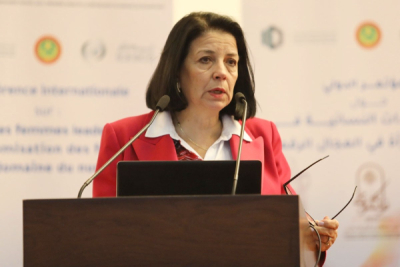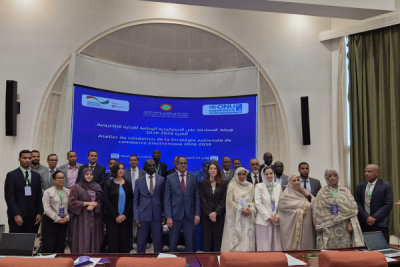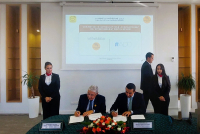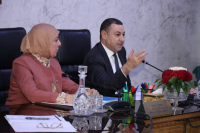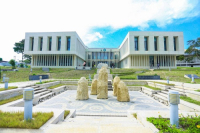
Tech (1151)
- Djibouti seeks digital consultant to modernize disaster risk and warning systems
- Mission runs Nov 2025-Feb 2026 under UNDP, CIDCA-backed TIAEWS project
- Focus on AI, Big Data, SOPs, and training to boost national resilience
The government of Djibouti, through the Executive Secretariat for Disaster Risk Management (SEGRC), in partnership with the United Nations Development Programme (UNDP) and with support from the China International Development Cooperation Agency (CIDCA), issued a call for applications on Sunday, November 2. It seeks an international consultant specializing in digital transformation for risk management and early warning systems.
The consultant will assist the SEGRC in assessing the country’s digital preparedness for disaster prevention and response. The mission, scheduled from November 2025 to February 2026, will include developing technical and strategic recommendations to improve digital governance and strengthen institutional capacity for national resilience.
Priority objectives include integrating advanced data processing and analysis technologies, including Big Data, artificial intelligence (AI), and platform interoperability, as well as optimizing national infrastructure and emergency operations centers. The consultant will also help draft Standard Operating Procedures (SOPs) and design training modules for operators and public officials.
The initiative is part of the “Tailored Intelligence for Actionable Early Warning Systems (TIAEWS)” project, which aims to strengthen national resilience to disasters. The project seeks to modernize Djibouti’s risk management system by incorporating advanced data collection and analysis tools, improving coordination among institutions, and providing more reliable and actionable early warnings to protect citizens and critical infrastructure.
The position is open to professionals with extensive experience in digital transformation for risk management. The selected candidate will deliver several key outputs, including an assessment of the country’s current digital landscape, a strategic roadmap for modernizing early warning systems, and policy recommendations.
Applications must be submitted by November 10 via the United Nations portal.
Samira Njoya
- Algeria approves draft law on digital trust, e-signatures, and ID services
- Law gives electronic documents full legal status, updates 2015 regulations
- Reform supports rising internet use, aims to boost digital economy and trust
The Algerian government approved a draft law on Sunday, November 2, that defines the general rules governing trust services for electronic transactions and digital identification. The initiative aims to support the growing digitalization of administrative, economic, and financial services while enhancing the security of online exchanges.
The text, reviewed by the Council of Ministers, establishes a comprehensive framework for digital trust. It updates the 2015 legislation on electronic signatures and certification, which officials deemed obsolete due to technological advancements. The new law grants legal value to electronic documents, including electronic signatures, seals, and timestamps, equivalent to their physical counterparts.
This reform comes amid rapid digital expansion. At the beginning of 2025, Algeria counted approximately 36.2 million internet users, representing a penetration rate of nearly 77%. The government states this dynamic necessitates a more robust legal environment to guarantee transaction reliability and personal data protection.
The project also introduces a national digital identification framework based on the existing biometric identity card. This system will centralize and secure citizen identities for online procedures, simplifying access to public services and ensuring legal recognition of digital transactions. It is considered a pillar of the national digitalization strategy, which aims to modernize the administration, enhance transparency, and combat corruption.
Beyond updating the legal framework, the law is expected to drive new momentum by reinforcing the confidence of citizens and businesses, simplifying administrative procedures, and stimulating investment in the digital economy. It should also enable Algeria to better leverage its significant digital potential, which includes over 55 million mobile connections, nearly 116% of the population, and rapidly growing digital equipment penetration.
Samira Njoya
- Morocco drafts “Digital X.0” law to regulate AI, data, and identity
- Bill supports digital sovereignty, interoperability, and cybersecurity reforms
- Part of Maroc Digital 2030 strategy to boost AI and public service tech
Morocco is preparing to give its digital ecosystem a major legal overhaul with a new framework law known as “Digital X.0,” now under review by the General Secretariat of the Government. The draft, presented by Amal El Fallah Seghrouchni, Minister Delegate for Digital Transition and Administrative Reform, aims to integrate artificial intelligence (AI) into public and private operations while establishing strict governance for data and algorithms.
At the core of the bill are three priorities: data governance, digital identity, and interoperability. “Digital X.0” sets out principles for the flow and protection of data in line with Morocco’s existing personal data law (Law 09-08). It introduces a sector-specific digital identity that limits data access to what is strictly necessary for each area of activity and an interoperability model based on traceable consent, ensuring that any exchange of information between public agencies or private actors is explicitly authorized by users. Cybersecurity is a key element of the framework, designed to build digital trust without adding excessive layers of control.
The reform is part of Morocco’s national digital strategy, “Maroc Digital 2030,” which identifies artificial intelligence as a cornerstone of economic development and administrative modernization. The country has invested heavily in digital infrastructure, e-government services, and applied research in emerging technologies.
Recently, Morocco deepened this push through a strategic partnership with French startup Mistral AI to establish a lab focused on multilingual language models in Arabic, Amazigh, and African languages. The government has also launched a national program to train 200,000 young people in digital and AI skills to strengthen human capital and drive local innovation.
With “Digital X.0,” Morocco seeks to consolidate digital sovereignty, foster a competitive AI ecosystem, and promote responsible innovation. The law is expected to speed up the digital modernization of public administration and enhance the quality and efficiency of government services through advanced technologies.
Samira Njoya
- Q3 revenue rose to CFA875.7 billion ($1.6 billion), up 9.9% year-on-year
- EBITDAaL increased 7.8% to CFA305.3 billion
- Growth driven by mobile data, fiber, and expansion in Liberia and Burkina Faso
Orange Côte d’Ivoire Group reported revenue of CFA875.7 billion, about $1.6 billion, in the third quarter of 2025, marking a 9.9% increase compared with the same period in 2024, according to the company’s consolidated financial results released in October 2025.
“The company’s revenue performance is mainly supported by mobile data and fiber, driven by subscriber base expansion and increased digital usage,” the report stated.
The document also noted that Orange Liberia “continues its positive momentum, boosted by improved network quality and effective floor price implementation,” while Orange Burkina Faso’s growth was supported by sustained mobile service expansion, the rise of mobile money, and ongoing fiber network development.
Beyond revenue, other key indicators also improved. Earnings before interest, tax, depreciation, and amortization after lease costs (EBITDAaL) grew 7.8% to CFA305.3 billion in Q3 2025. Net profit reached CFA118.8 billion, compared with CFA118.6 billion a year earlier.
- Draft law would require major platforms to open local offices and store data
- Firms must remove illegal content within 24 hours or face sanctions
- Plan aims to protect youth, uphold social values, and ensure digital sovereignty
Algeria’s government, through the National People’s Assembly (APN), is reviewing a draft law to impose strict regulation on major digital platforms. Introduced by lawmaker Bouhali Abdelbasset, the proposal targets services such as TikTok, Facebook, YouTube, and Instagram, placing them under direct legal supervision within Algeria.
The bill requires large platforms — those with more than one million users or above a certain revenue threshold — to establish a local office, appoint a legal representative, and store user data within the country or in certified centers. They would also be required to remove illegal content within 24 hours of notification and submit biannual compliance reports.
The initiative focuses on three main goals: preserving religious and social values, protecting children and adolescents from harmful content, and strengthening Algeria’s digital sovereignty. It also calls for the creation of a National Authority for Digital Space Regulation, attached to the Presidency, empowered to impose fines, block services, or initiate legal proceedings for violations.
The proposal comes as Algeria’s online presence expands rapidly. As of early 2025, the country counted 36.2 million internet users, representing a penetration rate of 76.9%. This surge has fueled the growth of social networks and influencers, along with rising concerns over extremist or socially inappropriate content.
If adopted, the law would significantly reshape Algeria’s digital landscape by holding major international platforms accountable, enhancing data protection and traceability, and promoting the emergence of locally adapted digital solutions.
-
The 2026–2030 strategy aims to build an inclusive and competitive e-commerce sector.
-
It targets women, youth, and small traders through digital integration and job creation.
-
Implementation faces challenges including low Internet access and financial inclusion.
The Mauritanian government, through the Ministry of Digital Transformation, Innovation and Administrative Modernization and with support from German cooperation agency GIZ, officially approved its National E-commerce Strategy 2026–2030 on Tuesday, October 28. The plan marks a key milestone toward developing a more inclusive, sustainable, and competitive digital economy.
The roadmap seeks to improve access for women entrepreneurs to online markets, create jobs for young people through freelancing and digital platforms, integrate small traders into the formal economy via digitization, and enhance government tax revenues through better transaction traceability. These goals are built on an emerging market where Internet penetration reached 37.4% in 2025.
The strategy comes amid a period of rapid digital transformation, with Africa’s e-commerce market expected to grow by 105% by 2030—from $55 billion to $112.73 billion—according to TechCabal Insights. Mauritania aims to leverage this momentum to strengthen its competitiveness and position its economy within regional digital value chains.
Success will depend on the country’s ability to overcome key structural challenges, including uneven mobile and Internet coverage, reliance on cash payments, and low banking penetration. According to UNCTAD, financial inclusion in Mauritania remains limited to 20.9%, with notable disparities between women (15.5%) and youth (13.1%).
The strategy aims to create a favorable environment for the growth of national e-commerce by promoting digital inclusion, expanding access to online platforms for marginalized economic actors, improving financial transparency, and increasing public revenues through formalized trade. Ultimately, it seeks to build a structured and competitive e-commerce ecosystem capable of supporting sustainable growth.
- Senegal launches 2025 Gov’athon to modernize public administration digitally
- Over 2,000 participants submitted 812 innovation projects for selection
- Hackathon supports national tech goals under 2025 “New Technological Deal”
The Senegalese government launched the second edition of Gov’athon, a national hackathon dedicated to digitally modernizing public administration, in Dakar on Friday, Oct. 24.
The initiative marks an important step in identifying and supporting practical solutions to improve public service efficiency and promote citizen-driven innovation.
The 2025 edition drew a strong response, with 812 projects submitted over 10 days by more than 2,000 participants from academic, entrepreneurial, and civic backgrounds. A total of 104 projects advanced to the final phase , 72 in the Student category, 11 in Startups, and 21 in Citizens.
The final round, scheduled for December, will follow an intensive mentoring and training program to help refine the shortlisted projects. A panel of experts will then select the winning teams in the Student and Startup categories. The winners will receive tailored support to transform their prototypes into operational tools for public administration.
Gov’athon is part of Senegal’s “New Technological Deal”, a national strategy launched in February 2025 to position the country as a leading player in Africa’s digital economy by 2034. The plan targets the creation of 500 certified startups, the training of 100,000 young people in digital professions, and a 95% connectivity rate.
The 2024 edition produced several high-impact projects, including AI Karangué, Firndé Bi, and Agri-Drone Vision, which received awards of 20, 10, and 5 million CFA francs, respectively. These projects highlighted Gov’athon’s key role in modernizing public administration and promoting local digital innovation in education, health, and agriculture.
With this new edition, the government aims to deepen the connection between citizen innovation and public governance while supporting homegrown tech entrepreneurship. The initiative is expected to make public services more efficient, accessible, and aligned with user needs.
Samira Njoya
- Morocco signs deal to boost inclusive digital entrepreneurship in Rabat-Salé-Kénitra
- Partnership supports startups via training, infrastructure, and strategic guidance
- Initiative aligns with “Digital Morocco 2030” goals of jobs, exports, and innovation
Morocco's Digital Development Agency (ADD) and the Management Association of the Center for Solidarity-Based Very Small Enterprises (CTPES) signed a partnership agreement on Monday, Oct. 27, in Salé to promote innovation and inclusive digital entrepreneurship.
The agreement focuses on the Rabat-Salé-Kénitra region and will be implemented through the Digital Solidarity Incubator (IDS).
Under the partnership, the two organizations plan to pool resources and expertise to support high-potential project leaders. They will ensure access to the IDS infrastructure, including its FabLab, provide technical and strategic support to digital startups, offer targeted training, and integrate supported projects into digital systems and platforms developed by the ADD.
The collaboration aligns with the "Digital Morocco 2030" strategy, the kingdom's roadmap for digital transformation. That plan aims to create 3,000 certified startups by 2030, mobilize 7 billion dirhams (about $758 million) in funding, and generate 240,000 direct jobs in the sector. It also targets raising digital exports to 40 billion dirhams by 2030, up from 13.4 billion dirhams recorded in the first quarter of the current year.
The partnership comes amid a dynamic entrepreneurial context. In the Rabat-Salé-Kénitra region, 6,399 companies were created during the first seven months of 2024, according to the Moroccan Office of Industrial and Commercial Property (OMPIC).
Nationally, Morocco's startup ecosystem is also progressing. The country ranks 88th globally and ninth in Africa in the Global Startup Ecosystem Index 2025 by U.S. consultancy StartupBlink, with growth estimated at 23% in 2025.
Beyond supporting entrepreneurship, the agreement marks a significant step in regionalizing the national digital policy. By connecting support mechanisms with young project leaders and local stakeholders, the initiative aims to boost digital inclusion, foster value creation, and encourage the emergence of a regional entrepreneurial base capable of contributing sustainably to Morocco's economic growth.
Samira Njoya
- Algeria launches expert digitalization committee to guide national tech policies
- Committee supports “Digital Algeria 2030” goals with expert recommendations
- Strategy targets 500,000 ICT jobs, 20% GDP from digital economy
The Algerian government, on Oct. 23, 2025, officially launched the Scientific and Technical Committee of the High Commission for Digitalization (CSTHCN) in Algiers. The new advisory body will help guide the country’s national digital policies.
Meriem Benmouloud, the High Commissioner for Digitalization, hosted the ceremony and described the committee as a new milestone in Algeria’s digital transformation, part of the structured process leading to the “Digital Algeria 2030” vision.
The 15-member committee, including three experts from the Algerian diaspora, brings together specialists in information technology, artificial intelligence, mathematics, economics, and financial systems. Its main tasks include providing recommendations, reviewing draft legislation and regulations on digitalization, and conducting research to anticipate technological trends and their economic impacts.
The committee’s creation marks the final step in establishing the High Commission for Digitalization, which was set up in 2023 to spearhead the nation’s digital transformation.
Two years later, the “Digital Algeria 2030” strategy has been finalized and is expected to begin implementation soon. The plan aims to train 500,000 ICT specialists, connect all public institutions, and raise the digital economy’s contribution to 20% of GDP by 2030.
Digital technology is playing an increasingly central role in Algeria’s economy. While the potential is significant, analysts point to a gap between major investments and tangible returns, highlighting the need for stronger oversight.
Through this committee, Algeria aims to accelerate the implementation of its digital policies, improve public service efficiency, promote digital inclusion, and unlock greater economic value from the sector.
Samira Njoya
-
The University of Dar es Salaam (UDSM) has digitized over 1,000 online courses accessible to 39,000 students across multiple campuses.
-
The initiative is part of the Higher Education for Economic Transformation (HEET) program, which is over 80% implemented.
-
UDSM’s digital infrastructure now includes a 10 Gbps high-speed network to support hybrid and remote learning.
Tanzania is accelerating the integration of information and communication technologies (ICT) to drive socio-economic development, with education at the forefront of this shift.
Speaking at a meeting with the Tanzania Editors Forum in Dar es Salaam on October 21, William A. L. Anangisye, Vice-Chancellor of the University of Dar es Salaam (UDSM), said the Higher Education for Economic Transformation (HEET) program represents a new stage in higher education reform.
Already more than 80% implemented, HEET aims to make digitalization a strategic tool for academic competitiveness and innovation.
The project reached a milestone with the launch of more than 1,000 digital courses, now available to 39,000 students across UDSM campuses in Dar es Salaam, Lindi, Kagera, and Zanzibar.
This digital offering relies on a 10 Gbps broadband infrastructure designed to support hybrid learning platforms and strengthen remote teaching capabilities.
Liberato Haule, Deputy Coordinator of the program, said the infrastructure “modernizes learning environments and enhances partnerships between universities and businesses.”
HEET, funded by both public and private partners, aims to foster collaboration between universities and the private sector in designing curricula focused on digital skills, engineering, and innovation.
Deodatus Balile, President of the Tanzania Editors Forum, praised the program as “a national benchmark in educational transformation.”
This initiative comes as the World Bank reports that only 9% of young Africans have access to higher education. By equipping its universities with cutting-edge digital tools, Tanzania seeks to position itself as a regional hub for training and innovation, aligning education more closely with employment and industrial growth.
This article was initially published in French by Félicien Houindo Lokossou
Adapted in English by Ange Jason Quenum
More...
-
The new digital platform will connect farmers and buyers to improve market access.
-
Developed by the government and FAO, it aims to cut post-harvest losses and boost efficiency.
-
Agriculture accounts for 14% of GDP and 80% of exports but faces structural challenges.
The government of São Tomé and Príncipe, in partnership with the Food and Agriculture Organization (FAO), officially launched on October 24, a new digital platform designed to help farmers promote and sell their products.
Developed by the Directorate of Entrepreneurship at the government’s request, the platform seeks to streamline the movement of agricultural goods from field to market, reduce post-harvest losses, and bring producers and consumers closer together. Designed to be simple and accessible, it builds on existing digital habits among local farmers, many of whom already use smartphones and WhatsApp.
The initiative forms part of a broader program to promote youth employment in agriculture. The sector remains central to the national economy, contributing about 14% of GDP and nearly 80% of export earnings, according to the French Development Agency (AFD). However, it still faces structural challenges, including limited market access, lack of price and demand information, weak distribution networks, and high post-harvest losses.
The new platform is positioned as a strategic tool to turn the country’s agricultural potential into real economic value. It aims to strengthen the competitiveness of local value chains, improve market access, diversify trade opportunities, and create new prospects for young rural entrepreneurs. Over time, this digitalization of agriculture is expected to improve traceability, raise farmers’ incomes, and modernize the rural economy of the archipelago.
- Project aims to boost transparency and revenue collection
- Full national rollout planned for January 2026
Gabon is set to launch, on October 30, a pilot project to digitize its social security and tax collection systems, according to the Ministry of Digital Economy and Innovation. The move follows a recent meeting with key institutions responsible for social contributions and public revenue.
The initiative involves rolling out an integrated digital system to automate the collection of social security and tax payments, enable real-time transaction monitoring, and improve financial transparency. The pilot, which runs until December 15, will be followed by a full rollout in January 2026. The ministry said the technical platform is already operational and will serve as the foundation for modernizing fund management systems.
The project is part of broader efforts to streamline public administration and improve oversight of financial operations. Social funds — notably the National Health Insurance and Social Guarantee Fund (CNAMGS) and the National Social Security Fund (CNSS) — have long faced problems such as payment delays, slow manual processing, and limited traceability. Digitization is seen as a long-term solution to strengthen the collection and redistribution of social funds.
The reform supports the “Digital Gabon” strategy led by Transitional President Brice Clotaire Oligui Nguema, who has made digital technology a key driver of public sector reform. The Digital Economy Ministry has already launched complementary projects, including digitizing the civil service payroll system and linking financial management agencies through the SIGFiP platform, which is now being deployed.
In the long term, digitizing these systems is expected to enhance transparency in public fund management, boost revenue mobilization, and reduce the costs associated with manual processes. It will also give the government a comprehensive view of its institutions’ finances, helping to strengthen public and business confidence in state services.
Samira Njoya
- TAHA launches HortiMarket to digitize Tanzania’s horticulture trade
- Platform links producers, buyers via web, app, WhatsApp, and USSD
- Low rural internet access may hinder platform’s wide adoption
The Tanzania Horticultural Association (TAHA) has launched a new digital platform to connect producers, buyers, exporters, and service providers within the horticulture sector. The platform, named HortiMarket, is accessible via a website, a mobile application, a WhatsApp chatbot, and a USSD code, local media outlet Tanzania Invest reported on Monday, Oct. 20.
The new digital portal will serve as a centralized online marketplace where horticultural value chain actors can interact, exchange information, and complete transactions. HortiMarket is designed as a strategic response to persistent market access challenges that hinder the growth and competitiveness of Tanzania's horticulture sector.
According to TAHA, the digital service will enable stakeholders to access new opportunities, make informed decisions, and improve supply chain coordination, thereby boosting the overall efficiency and profitability of horticultural trade.
This pursuit of more efficient marketing channels is part of a broader strategy to grow the sector's export segment. In June, TAHA announced its goal to increase fruit and vegetable export revenues to $2 billion by 2030. This figure is nearly five times the annual average of $382 million generated by the sector between 2021 and 2024, according to data compiled by the country's central bank.
A key challenge for TAHA will be effectively integrating the over 500,000 smallholder producers active in the local horticulture industry through the new digital platform. The deployment of a digital service in the agricultural sector raises concerns about accessibility in rural areas, where the use of the internet and smartphones remains limited.
Data from the International Telecommunication Union (ITU) shows that 31.9% of the population in Tanzania has internet access, suggesting that nearly two-thirds of the population remain unconnected. This digital divide could limit the platform’s adoption, particularly as nearly 60% of Tanzanians live in rural areas where agriculture is essential to their livelihood, according to World Bank data.
Stéphanas Assocle
- Digital Telecom, AS Datel partner on African land digitization
- E-cadaster to boost tax, transparency, and resource tracking
- Geospatial tech market in region set to hit $69.7B by 2030
Digital Telecom, an Abidjan-based subsidiary of Digital Afrique Telecom (DAT), announced a partnership on Wednesday, Oct. 22, with Estonia’s AS Datel, a geospatial technology firm. The agreement aims to deploy advanced satellite and digital cadastral solutions across Africa to modernize land management, detect illegal construction, and track illegal mining.
“By partnering with AS Datel, we are bringing world-class satellite and e-governance systems to Africa,” said Simplice Anoh, CEO of Digital Telecom. “This is more than just technology; it’s about empowering governments to protect their resources, ensure transparency, and increase revenue that can be reinvested in public services.”
The partnership focuses on deploying an advanced e-cadaster system — a centralized, fully digital platform that will integrate updatable cadastral maps, automated property tax modules, and tools to secure and manage data exchanges. The innovation will enable local and national authorities to maintain accurate property records, streamline tax collection, and improve transparency for citizens and investors.
Estonia’s AS Datel comes from a country renowned for its excellence in e-governance and secure digital systems. The company brings proven expertise in Geographic Information Systems (GIS) and Earth observation. For Digital Telecom and its parent company, the initiative aligns with African governments’ drive to modernize land systems, improve resource management, and strengthen fiscal transparency.
The project comes as the geospatial technology market rapidly expands in the region. According to Grand View Research, the sector in the Middle East and Africa is projected to reach $69.7 billion by 2030, driven by growing adoption of geolocation, remote sensing, and spatial analysis tools in agriculture, resource management, and urban planning.
Ultimately, the partnership is expected to transform how African authorities register assets, enforce property taxes, and combat illegal activities. By equipping states with reliable digital tools, it paves the way for more transparent governance, higher public revenues, and stronger protection of environmental resources.
Samira Njoya




